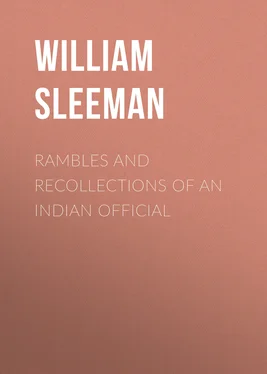William Sleeman - Rambles and Recollections of an Indian Official
Здесь есть возможность читать онлайн «William Sleeman - Rambles and Recollections of an Indian Official» — ознакомительный отрывок электронной книги совершенно бесплатно, а после прочтения отрывка купить полную версию. В некоторых случаях можно слушать аудио, скачать через торрент в формате fb2 и присутствует краткое содержание. Жанр: Путешествия и география, История, foreign_edu, foreign_antique, foreign_prose, на английском языке. Описание произведения, (предисловие) а так же отзывы посетителей доступны на портале библиотеки ЛибКат.
- Название:Rambles and Recollections of an Indian Official
- Автор:
- Жанр:
- Год:неизвестен
- ISBN:нет данных
- Рейтинг книги:4 / 5. Голосов: 1
-
Избранное:Добавить в избранное
- Отзывы:
-
Ваша оценка:
- 80
- 1
- 2
- 3
- 4
- 5
Rambles and Recollections of an Indian Official: краткое содержание, описание и аннотация
Предлагаем к чтению аннотацию, описание, краткое содержание или предисловие (зависит от того, что написал сам автор книги «Rambles and Recollections of an Indian Official»). Если вы не нашли необходимую информацию о книге — напишите в комментариях, мы постараемся отыскать её.
Rambles and Recollections of an Indian Official — читать онлайн ознакомительный отрывок
Ниже представлен текст книги, разбитый по страницам. Система сохранения места последней прочитанной страницы, позволяет с удобством читать онлайн бесплатно книгу «Rambles and Recollections of an Indian Official», без необходимости каждый раз заново искать на чём Вы остановились. Поставьте закладку, и сможете в любой момент перейти на страницу, на которой закончили чтение.
Интервал:
Закладка:
The following conversation took place one morning between me and a native gentleman at Jubbulpore soon after suttees had been prohibited by Government:—
'What are the castes among whom women are not permitted to remarry after the death of their husbands?'
'They are, sir, Brahmans, Rājpūts, Baniyās (shopkeepers), Kāyaths (writers).'
'Why not permit them to marry, now that they are no longer permitted to burn themselves with the dead bodies of their husbands?'
'The knowledge that they cannot unite themselves to a second husband without degradation from caste, tends strongly to secure their fidelity to the first, sir. Besides, if all widows were permitted to marry again, what distinction would remain between us and people of lower caste? We should all soon sink to a level with the lowest.'
'And so you are content to keep up your caste at the expense of the poor widows?'
'No; they are themselves as proud of the distinction as their husbands are.'
'And would they, do you think, like to hear the good old custom of burning themselves restored?'
'Some of them would, no doubt.'
'Why?'
'Because they become reunited to their husbands in paradise, and are there happy, free from all the troubles of this life.'
'But you should not let them have any troubles as widows.'
'If they behave well, they are the most honoured members of their deceased husbands' families; nothing in such families is ever done without consulting them, because all are proud to have the memory of their lost fathers, sons, and brothers so honoured by their widows. 62 62 Widows are not always so well treated. Their life in Lower Bengal, especially, is not a pleasant one,
But women feel that they are frail, and would often rather burn themselves than be exposed all their lives to temptation and suspicion.'
'And why do not the men burn themselves to avoid the troubles of life?'
'Because they are not called to it from Heaven, as the women are.'
'And you think that the women were really called to be burned by the Deity?'
'No doubt; we all believe that they were called and supported by the Deity; and that no tender beings like women could otherwise voluntarily undergo such tortures—they become inspired with supernatural powers of courage and fortitude. When Dulī Sukul, the Sihōrā 63 63 Sihōrā, on the road from Jubbulpore to Mirzāpur, twenty-seven miles from the former, is a town with a population of more than 5,000. A smaller town with the same name exists in the Bhandāra district of the Central Provinces.
banker's father, died, the wife of a Lodhī cultivator of the town declared, all at once, that she had been a suttee with him six times before; and that she would now go into paradise with him a seventh time. Nothing could persuade her from burning herself. She was between fifty and sixty years of age, and had grandchildren, and all her family tried to persuade her that it must be a mistake, but all in vain. She became a suttee, and was burnt the day after the body of the banker.'
'Did not Dulī Sukul's family, who were Brahmans, try to dissuade her from it, she being a Lodhī, a very low caste?'
'They did; but they said all things were possible with God; and it was generally believed that this was a call from Heaven.'
'And what became of the banker's widow?'
'She said that she felt no divine call to the flames. This was thirty years ago; and the banker was about thirty years of age when he died.'
'Then he will have rather an old wife in paradise?'
'No, sir; after they pass through the flames upon earth, both become young in paradise.'
'Sometimes women used to burn themselves with any relic of a husband, who had died far from home, did they not?'
'Yes, sir, I remember a fisherman, about twenty years ago, who went on some business to Benares from Jubbulpore, and who was to have been back in two months. Six months passed away without any news of him; and at last the wife dreamed that he had died on the road, and began forthwith, in the middle of the night, to call out "Sat, sat, sat!" Nothing could dissuade her from burning; and in the morning a pile was raised for her, on the north bank of the large tank of Hanumān, 64 64 The monkey-god. His shrines are very numerous in the Central Provinces and Bundēlkhand.
where you have planted an avenue of trees. There I saw her burned with her husband's turban in her arms, and in ten days after her husband came back.'
'Now the burning has been prohibited, a man cannot get rid of a bad wife so easily?'
'But she was a good wife, sir, and bad ones do not often become suttees.'
'Who made the pile for her?'
'Some of her family, but I forget who. They thought it must have been a call from Heaven, when, in reality, it was only a dream.'
'You are a Rājpūt?'
'Yes.'
'Do Rājpūts in this part of India now destroy their female infants?'
'Never; that practice has ceased everywhere in these parts; and is growing into disuse in Bundēlkhand, where the Rājās, at the request of the British Government, have prohibited it among their subjects. This was a measure of real good. You see girls now at play in villages, where the face of one was never seen before, nor the voice of one heard.'
'But still those who have them grumble, and say that the Government which caused them to be preserved should undertake to provide for their marriage. Is it not so?'
'At first they grumbled a little, sir; but as the infants grew on their affections, they thought no more about it.' 65 65 Within the last hundred years more than one officer has believed that infanticide had been suppressed by his efforts, and yet the practice is by no means extinct. In the Agra Province the severely inquisitorial measures adopted in 1870, and rigorously enforced, have no doubt done much to break the custom, but, in the neighbouring province of Oudh, the practice continued to be common for many years later. A clear case in the Rāi Barelī District came before me in 1889, though no one was punished, for lack of judicial proof against any individual. The author discusses infanticide as practised in Oudh in many passages of his Journey through the Kingdom of Oudh (Bentley, 1858), It is possible that female infanticide may be still prevalent in many Native States. Mr. Willoughby in the years preceding A.D. 1849 made great progress in stamping it out among the Jharejas of the Kathiāwār States in the Bombay Presidency. There is reason to hope that the crime will gradually disappear from all parts of India, but it is difficult to say how far it still prevails, though the general opinion is that it is now comparatively rare ( Census Report, India , 1911, p. 217).
Gurcharan Baboo, the Principal of the little Jubbulpore College, 66 66 A college of more pretensions now exists at Jabalpur (Jubbulpore), and is affiliated in Arts and Law to the University of Allahabad established in 1887. The small college alluded to in the text was abolished in 1850.
called upon me one forenoon, soon after this conversation. He was educated in the Calcutta College; speaks and writes English exceedingly well; is tolerably well read in English literature, and is decidedly a thinking man . After talking over the matter which caused his visit, I told him of the Lodhī woman's burning herself with the Brahman banker at Sihōrā, and asked him what he thought of it. He said that 'In all probability this woman had really been the wife of the Brahman in some former birth—of which transposition a singular case had occurred in his own family.
'His great-grandfather had three wives, who all burnt themselves with his body. While they were burning, a large serpent came up, and, ascending the pile, was burnt with them. Soon after another came up, and did the same. They were seen by the whole multitude, who were satisfied that they had been the wives of his great-grandfather in a former birth, and would become so again after this sacrifice. When the "srāddh", or funeral obsequies, were performed after the prescribed intervals, 67 67 For description of the tedious and complicated 'srāddh' ceremonies see chapter 11 of Monier Williams's Religious Thought and Life in India .
the offerings and prayers were regularly made for six souls instead of four; and, to this day, every member of his family, and every Hindoo who had heard the story, believed that these two serpents had a just right to be considered among his ancestors, and to be prayed for accordingly in all "srāddh".'
Интервал:
Закладка:
Похожие книги на «Rambles and Recollections of an Indian Official»
Представляем Вашему вниманию похожие книги на «Rambles and Recollections of an Indian Official» списком для выбора. Мы отобрали схожую по названию и смыслу литературу в надежде предоставить читателям больше вариантов отыскать новые, интересные, ещё непрочитанные произведения.
Обсуждение, отзывы о книге «Rambles and Recollections of an Indian Official» и просто собственные мнения читателей. Оставьте ваши комментарии, напишите, что Вы думаете о произведении, его смысле или главных героях. Укажите что конкретно понравилось, а что нет, и почему Вы так считаете.












